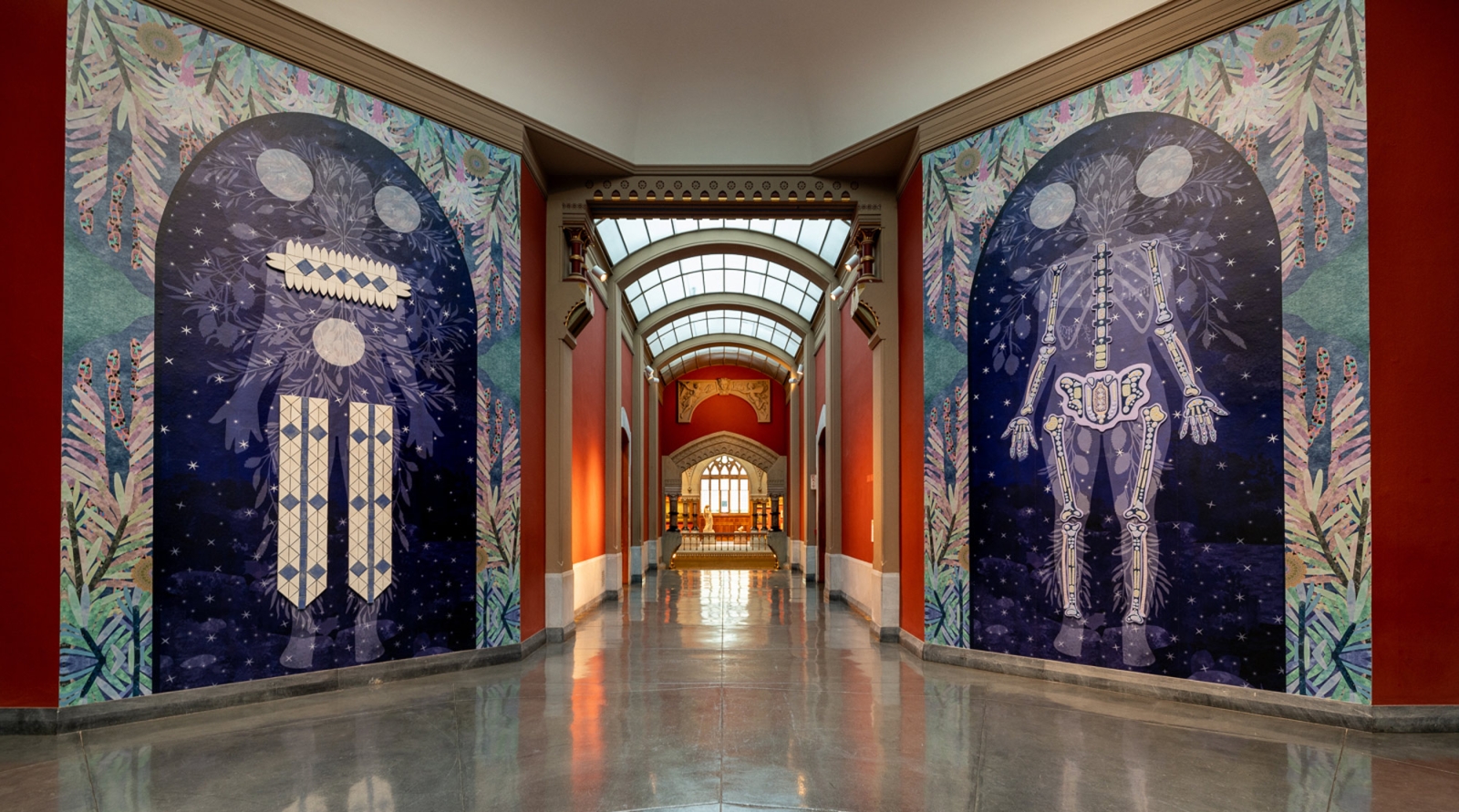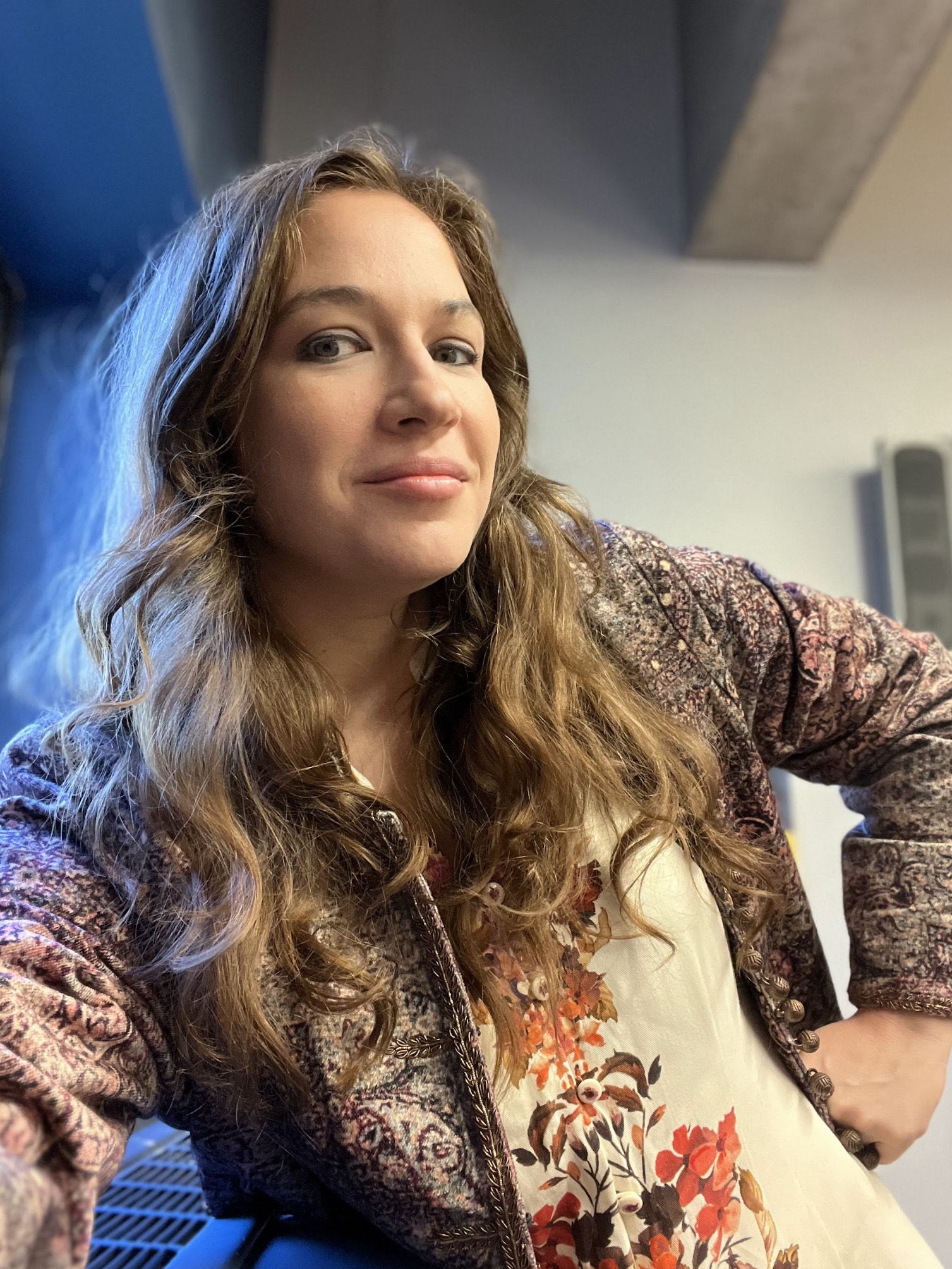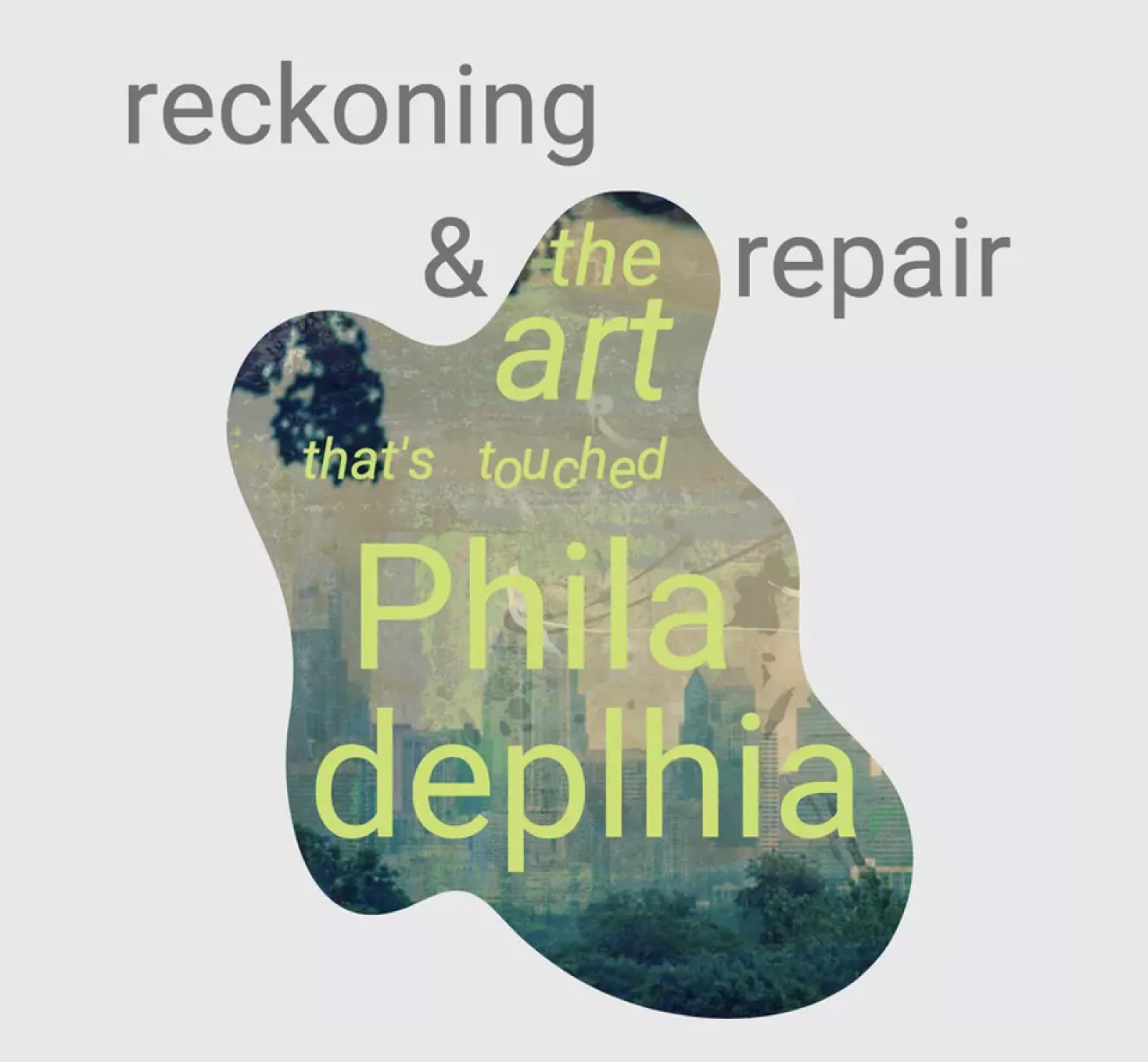The Art of Podcasting
A Center for Experimental Ethnography course lets students engage with artists via in-depth audio interviews, to examine questions of empire and exclusion.
Can contemporary artistic practice help repair centuries of social inequity? Can museums reckon effectively with their own exclusionary or exploitive histories? Those questions and many others are at the heart of a podcast produced by students in the course Reckoning and Repair: Conversations with Contemporary Artists, taught by Alissa Jordan and offered through the Center for Experimental Ethnography (CEE), where Jordan is associate director.

Artist Saya Woolfalk—whose 2022 multimedia installation “We Emerge at the Sunset of Your Ideology” is pictured here—is one of many artists part of the “Rising Sun: Artists in an Uncertain America” running at the Pennsylvania Academy of the Fine Arts and the African American Museum in Philadelphia through October 8. (Image by Constance Mensh, courtesy of PAFA)
“The CEE is a hub at Penn for experimental methods—‘experimental’ understood here in the artistic or playful sense,” Jordan says. The CEE promotes multimodal research practices: projects with multiple modes of communication, like presenting research not through a traditional paper, but rather through a combination of text, visual expression, video, and audio. “We want to create support for that and to have these types of investigations regarded as serious scholarship at the university level,” says Jordan.

Alissa Jordan, Center for Experimental Ethnography associate director, has a background at the interface of medicine, arts, and anthropology. She describes herself as a multimodal medical anthropologist. (Image: Courtesy Alissa Jordan)
Direct interaction with arts and community-based institutions throughout Philadelphia is another core part of CEE’s mission. To that end, Jordan and colleagues had been talking with curators at the Pennsylvania Academy of the Fine Arts (PAFA) and the African American Museum in Philadelphia (AAMP) about how to engage Penn students in an ambitious joint exhibition the two museums were planning, Rising Sun: Artists in an Uncertain America. It was the perfect fit for the course Jordan envisioned.
The exhibition opened at both venues this spring and examines the question, “Is the sun rising or setting on the experiment of American democracy?” The Penn students—graduate and advanced undergraduate students mainly in anthropology, fine arts, and Africana studies—responded to the exhibit’s theme via a podcast focused on in-depth conversations with the Rising Sun artists, curators, and organizers. “Out of these recorded conversations,” Jordan says, “we would create short audio documentaries for the exhibition website, as well as provide a historical archive of this moment in American history.”
The resulting podcast, “Reckoning and Repair: The Art That’s Touched Philadelphia,”—written, recorded, and produced by Jordan’s students—delves into the ways that artists and exhibit organizers confront the troubling histories of empire in their midst.
Telling Meaningful Stories
The joint exhibit was several years in the making. Exhibit planning, delayed by the COVID-19 pandemic and leadership changes at the two museums, dovetailed with Black Lives Matter protests, intensifying ongoing efforts at arts institutions to reconcile with racist pasts. “There was a confluence of energies,” Jordan says.

The dozen 15-minute episodes of the podcast were written, recorded, and produced by Jordan’s students. Each conversation delves into the ways that artists and exhibit organizers confront the troubling histories of empire in their midst.
But before any meaningful podcast production could begin, Jordan’s students first needed to acquire the specialized skills involved in such a project. With funding from graduate research grants, the CEE had previously purchased media equipment for Penn students and faculty to use, so Jordan took advantage of that resource. As students familiarized themselves with professional audio gear—only one had prior experience—they also explored the work of artists involved in Rising Sun willing to participate in their project.
Each student would eventually create one podcast episode, yet they worked as co-creators, Jordan says. “We wanted to develop a collective voice, and we used our class sessions to think about that voice and about how each student’s project would be one iteration of that voice.”
Students practiced interviewing and developing active listening skills, sharing with each other their own experiences of the effect of art, as well as personal stories of difficult histories. “Getting someone to tell a story that’s meaningful to them, that’s a whole process,” says Jordan. “By the time the students sat down with the artists, they were able to have great conversations. In a sense, they learned how to be journalists as well as oral historians.”
Varied Voices
Aside from the Rising Sun artists, the pool of interview subjects for the podcast also included other artists who have lived or worked in Philadelphia, as well as the exhibit’s curators and organizers.
The first of the 15-minute episodes, “Telling Our Own Stories,” came out in February. It features reflections by MacArthur prize-winning documentary filmmaker and activist Louis Massiah in conversation with Chrislyn Laurie Laurore, an anthropology Ph.D. student. Massiah, founder of Philadelphia-based Scribe Video, discusses how participatory community media helps ordinary Philadelphians craft narratives about their lives and neighborhoods in the context of local and national history.
In Scribe Video’s early days in the mid-1980s, community groups would approach Scribe staff for help documenting neighborhood challenges such as homelessness and housing issues, but as Massiah tells Laurore, he decided to put the tools into the hands of community residents. “The idea was that if we could train groups in the skills and the language of documentary filmmaking, they could do the work themselves,” he says.
In “Bodies in Flux: Self-Portraiture Outside the Canvas with Saya Woolfalk,” undergraduate fine arts student Wang-Yao, C’23, interviews Brooklyn-based artist Saya Woolfalk, who has a large installation on view at PAFA titled, We Emerge at the Sunset of Your Ideology. The conversation for the podcast, however, revolves around the artist’s installation at the Newark Museum of Art, in New Jersey, where she has been artist-in-residence since 2019. (Woolfalk is also a former faculty fellow at CEE.)
Her Newark project, Tumbling into Landscape, explores questions of identity and Americanness. Woolfalk, who is African-American and Japanese, fills an outline of her body with images derived from Hudson River School landscape paintings in the Museum’s collection, which Woolfalk calls “beautiful but alienating” for the peoples and cultures left out of those pictures. In the podcast, she tells Wang-Yao that the piece asks, ‘What does it mean to be an alien in a place that you call home?’”
In another episode, Hakimah Abdul Fattah, also an anthropology doctoral student, speaks with Dejay Duckett, Vice President of Curatorial Services at AAMP and a co-curator of Rising Sun, about her journey as a museum professional. The episode’s title, “We are Here,” refers to a childhood experience Duckett had with a painting at the Philadelphia Museum of Art. The 19th-century work, The Moorish Chief, by Eduard Charlemont, depicts a regal-looking Black man in gleaming white robes standing at the entrance to a beautiful palace.
“They say representation matters,” Duckett tells Fattah. “When I saw that painting, I thought, ‘That’s me, that’s my dad, we are here.’ It’s part of what made me want to talk about art with other people and be a part of the museum and bring those stories to the forefront.”
An Ongoing Exploration
Jordan and her students ultimately learned that repair and decolonization, whether through art-making or social activism, are ongoing processes. “We live in social worlds that still haven’t fully reckoned with their histories,” she says. “We were guided by the artists’ conversations. We wanted to see what repair might look like for them. I don’t think there is one position on that.
“That being said,” Jordan continues, “I think the artists demonstrated phenomenal engagements and efforts to heal and care for their communities through their work. And I think that PAFA staff had to meaningfully reexamine the museum’s history as one of the oldest and most exclusive art institutions. That resonated with us because the Center for Experimental Ethnography is located in the Penn Museum, which of course has its own history of reckoning with colonial violence.”
Students at CEE continue following these threads. To produce a second podcast season, “The Art of Resistance in Argentina,” undergraduate Anya Miller, C’23, traveled to Argentina to interview artists and art organizers who were grappling with art made in the wake of historical dictatorship. A third season, which will also be place-based, is set to be released in March 2024.
Students from the Reckoning and Repair: Conversations with Contemporary Artists course will talk about their podcast project in an Art at Noon event at the Pennsylvania Academy of the Fine Arts on Wednesday, July 12. Click here for details. All episodes of the Reckoning and Repair podcast are available here.


